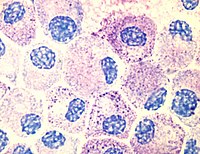
Photo from wikipedia
Oxidised phosphatidylcholines (OxPCs) are produced under conditions of elevated oxidative stress and can contribute to human disease pathobiology. However, their role in allergic asthma is unexplored. The aim of this… Click to show full abstract
Oxidised phosphatidylcholines (OxPCs) are produced under conditions of elevated oxidative stress and can contribute to human disease pathobiology. However, their role in allergic asthma is unexplored. The aim of this study was to characterise the OxPC profile in the airways after allergen challenge of people with airway hyperresponsiveness (AHR) or mild asthma. The capacity of OxPCs to contribute to pathobiology associated with asthma was also to be determined. Using bronchoalveolar lavage fluid from two human cohorts, OxPC species were quantified using ultra-high performance liquid chromatography-tandem mass spectrometry. Murine thin-cut lung slices were used to measure airway narrowing caused by OxPCs. Human airway smooth muscle (HASM) cells were exposed to OxPCs to assess concentration-associated changes in inflammatory phenotype and activation of signalling networks. OxPC profiles in the airways were different between people with and without AHR and correlated with methacholine responsiveness. Exposing patients with mild asthma to allergens produced unique OxPC signatures that associated with the severity of the late asthma response. OxPCs dose-dependently induced 15% airway narrowing in murine thin-cut lung slices. In HASM cells, OxPCs dose-dependently increased the biosynthesis of cyclooxygenase-2, interleukin (IL)-6, IL-8, granulocyte−macrophage colony-stimulating factor and the production of oxylipins via protein kinase C-dependent pathways. Data from human cohorts and primary HASM cell culture show that OxPCs are present in the airways, increase after allergen challenge and correlate with metrics of airway dysfunction. Furthermore, OxPCs may contribute to asthma pathobiology by promoting airway narrowing and inducing a pro-inflammatory phenotype and contraction of airway smooth muscle. OxPCs represent a potential novel target for treating oxidative stress-associated pathobiology in asthma. Unique profiles of oxidised phospholipids in the human lung correlate with airway pathophysiology. They are novel pro-inflammatory mediators with direct effects in structural cells via complex pathways, and are not targeted by standard asthma therapies. https://bit.ly/34UO2AL
Journal Title: European Respiratory Journal
Year Published: 2020
Link to full text (if available)
Share on Social Media: Sign Up to like & get
recommendations!